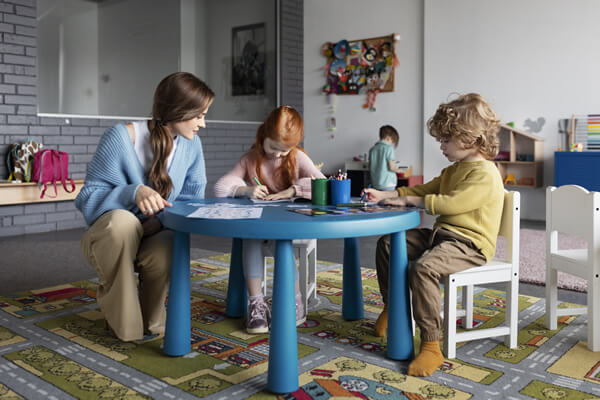What is the Best Parenting Time Schedule for Special Needs Children?
Divorce is difficult for children, and there is no question that it is especially hard on children with special needs; children who require additional assistance, supports and accommodations for disabilities that could be medical/physical, developmental or psychological. At school, special needs children usually have an Individualized Educational Plan (IEP) – a plan and/or program that is designed and implemented to support a disabled child’s specific elementary and secondary learning needs. However, when it comes to divorce, there isn’t a universally agreed upon parenting time plan or program that attorneys or the court rely on for divorcing parents with a special needs child. Instead, and because each child’s challenges and family dynamic is unique, parents do their best to figure out a specific visitation plan; that is most often achieved via settlement or mediation, but when parents can’t reach agreement, the schedule is ultimately determined by the court.
In my experience as a child psychologist and custody evaluator, additional care and consideration needs to be given when developing a parenting time schedule for a special needs child. This is because children with impairments, limitations and/or deficits have additional vulnerabilities and challenges, and they require a visitation plan that respectfully supports their needs and wellbeing. Separated and divorcing parents most often want more time with their child; however, when a special needs child is involved, I always assert that the quality of visitation time is more important than the quantity of time.
While there isn’t a one size fits all parenting time schedule for special needs children, there are supporting factors to consider, and I offer the following tips:
Bury the hatchet…and bury it fast. Divorce is an emotionally painful process, and even when it’s clear that the marriage is over, there is understandably still hurt and upset to process; in the end loss is loss, and anyone going through a divorce needs to come to terms with things emotionally before moving on. However, as a parent, remaining hurt and/or angry – even if you feel justified to do so — isn’t good for anyone. Special needs children are especially vulnerable to parental problems and discord, so striving to be flexible, thoughtful, and collaborative with one another as parents regarding your special needs child’s wellbeing as quickly as possible is advised.
In my opinion, a good parenting plan should be flexible enough for parents to work together when problems arise, but also enforceable enough if a parent’s behavior becomes problematic or if a parent violates the order. For example, if a child is having significant emotional difficulty separating from the custodial parent for visitation with the non-custodial parent, being loving and supportive with that child as parents toward a solution is what’s most important. Or, if a child might benefit from extending visitation or spending an additional night with a parent due to their struggles, collaborating to determine what’s in that child’s best interests in that situation would be correct. Sure, you can get angry in these moments, and sure you can choose to assert your rights and escalate that anger with your ex and/or with the child, but that approach would likely do more harm than good. Developing a parenting visitation plan and order that considers the special needs child’s capacity and wellbeing — a plan that incorporates parental collaboration and flexibility – is the right thing to do. Staying angry and remaining focused on your rights is the wrong thing to do.
Lastly, when parents can’t find agreement in the visitation schedule, or other important parenting areas, engaging a co-parenting therapist to resolve conflicts may be helpful. For longstanding and ongoing high conflict co-parenting situations, a mature and highly skilled parenting coordinator may also be needed to address disagreements around a special needs child’s routines, treatments and parenting visitation schedule.
Develop a plan that fits your child’s needs. The moniker, “special needs,” can include a wide range of capabilities and conditions, and thus, it’s important for parents to agree on the main factors influencing their child’s functioning and ongoing needs. Are you as parents in agreement regarding your child’s temperament and personality style (including his or her strengths and challenges)? Are you in agreement regarding your child’s diagnosis and treatment(s)? Are you in agreement regarding which parent has more capacity and availability to care for your child? Are you in agreement regarding who your child has historically viewed and experienced as being the more involved, consistent and reliable parent regarding their care and needs? Developing a parenting visitation schedule that fits your child’s needs may mean that one parent spends more time with the child than the other parent, and for some parents, that’s difficult to accept and agree to. If reaching agreement with your ex is difficult, meeting with a parenting professional for individual guidance and support may also be helpful.
Limit transitions. Having a consistent routine and stability in residential placement is very important for a lot of special needs children. While some special needs children require frequent contact with both parents, too much back and forth between the two parental homes can be difficult for special needs children to manage in general, especially during the school week. Sometimes additional shorter visits (e.g., dinners) during the school week with the non-custodial parent can advantageously bridge a longer break between the child’s two homes.
Be conservative with adjustments. As noted earlier, divorce, and all the changes and adjustments that come with it, can be especially difficult on special needs children. Thus, for the first year (and sometimes longer), I recommend that parents keep life as predictable and consistent as possible in all other ways for a special needs child. Remaining in the same home or moving to some place close if you must move, respecting and supporting family relations (e.g., relationships your child has with siblings, grandparents, etc.), not introducing your child to a new romantic partner, and not making any other sudden or drastic changes, will help your child to accept and grow into his or her next chapter of family life more easily. So, when you consider how you want to enjoy your visitation time with your child, keep in mind that for special needs children consistency supports emotional security, which in turn serves to reduce stress/anxiety.
Regardless of your custody arrangement, with a special needs child, working together as parents to create a parenting time schedule that is in the best interest of the child is so very important. Certainly, in developing a plan there are often many factors to consider and there may also be some hurdles to jump depending on the child’s functioning and needs, your family dynamic and your history as a couple. In my experience, however, the tallest hurdles to jump most frequently have less to do with the child’s needs and more to do with the parents’ longstanding hurt, upset and conflicts. When developing a parenting time schedule, try to remember that while you didn’t get the marriage right as a couple (for whatever reason or reasons), as parents to your special needs child, you can both work through the challenges that lie ahead to get the co-parenting right.











Michael Oberschneider, Psy.D. “Dr. Mike” is a clinical psychologist in private practice.
He can be reached at 703-723-2999, and is located at 44095 Pipeline Plaza, Suite 240, Ashburn.
